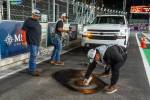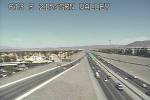Camera tickets
Nevada lawmakers in May allowed Assembly Bill 34 to die a quiet death. It would have lifted the state's ban on cameras that issue traffic citations, most notably to catch speeders and red-light runners.
Recent developments in other jurisdictions that have experimented with such cameras indicate state lawmakers acted wisely.
Putting aside the obvious Big Brother implications of cameras monitored by government agents recording our daily activities, the devices have simply not proven worth the expense in many places they've been tried.
In San Diego, officials revamped a red-light camera program after it was learned that the camera operators had condensed the regular yellow-light interval in order to issue more tickets and generate more revenue.
In Arizona, many towns gave up trying to issue photo speeding tickets because, in part, the massive influx in tickets was clogging the court system. In 2009, a Maricopa County judge with jurisdiction over north Glendale, Peoria, Sun City and Surprise refused to accept photo radar ticketing, calling it unconstitutional. A year later, the statewide program -- instituted by former Arizona Gov. Janet Napolitano, now the Homeland Security secretary -- was abolished.
And on Thursday, the Los Angeles City Council voted unanimously to shut down their red-light camera program because, "For a variety of reasons, including the way the law was written ... there are virtually no tangible consequences for those who refuse to pay," reports the Los Angeles Times.
In the first place, most camera tickets are simply mailed to the supposed offender. But the state has no way to know whether the intended recipient actually received the citation -- or even whether the registered owner of the vehicle cited was actually driving.
In other words, there's no reliable mechanism to collect the fines if the driver ignores the citation.
In addition, the systems often cost more than they generate in revenue -- and some studies, including in Los Angeles, have determined they have minimal effect on public safety.
Ineffective, intrusive, expensive and unenforceable. Other than those minor quibbles, the cameras are a wonderful idea.
No doubt a derivative of AB34 will materialize when Nevada lawmakers reconvene in Carson City come 2013. It will deserve the same fate as its cousin earned in 2011.























